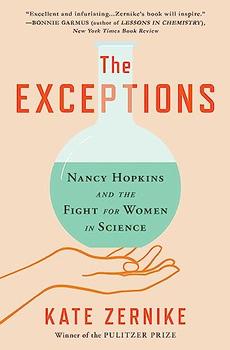Summary | Excerpt | Reading Guide | Reviews | Beyond the Book | Readalikes | Genres & Themes | Author Bio

Nancy Hopkins, MIT, and the Fight for Women in Science
by Kate Zernike
Bunting noted approvingly the year Nancy arrived that the number of Radcliffe sophomores declaring English as their major was the lowest in a decade, and there had been a significant decline in history as well. Though those were still by far the most popular majors, Bunting wrote in her annual report, "The trend is welcomed as an indication that Radcliffe students are becoming a little more adventurous and imaginative and perhaps serious in their choice of major fields." The number of Radcliffe students who married before graduation had fallen steadily—it had been 25 percent in 1955; it was about half that now. Perhaps because they were competing for fewer spots, Radcliffe women in Nancy's class were increasingly more accomplished than Harvard men—"fearfully bright," as Time magazine pronounced in its cover profile of the woman the magazine and her students called "Mrs. Bunting." The women arrived with higher SAT scores and were far more likely to graduate with honors.
There were rumblings of the revolution that would bring coeducation and increased racial diversity at the end of the decade. Spring of 1963, the year Ann graduated, was the first time Radcliffe women would be given Harvard diplomas. (Graduation was still separate, and President Pusey continued to send a faculty member in his stead.) Radcliffe relaxed the social rules that had required girls to sign out of their houses and secure permission to be out past one o'clock in the morning. (While Radcliffe's young women debated how this would affect dating and sex, Bunting thought the rules had disadvantaged young women who wanted to work all night in science labs.)
Still, Radcliffe girls who wanted a professional life had few role models on campus beyond Polly Bunting. The undergraduate faculty at Harvard had 295 tenured men, and 2 women—one, Cecilia Payne-Gaposchkin, had spent thirty years as a lecturer before being granted tenure. (Her salary had been listed on the budget under "equipment.") "What would happen if there was a genuine effort to see that one woman's name was present on every slate considered, as is now customary in government with respect to Negroes, would be interesting to observe," Bunting wrote in her annual report. Radcliffe administrators, she confessed, could themselves barely come up with candidates on the rare occasions they were asked. "Certainly it would be encouraging to Radcliffe students and probably revealing to Harvard men to have a greater number of able women scholars on the Faculty," she wrote, "provided that they are qualified."
It never occurred to Nancy to count the women in Bio 2. There were 47, and 178 men, about the same as the proportion of Radcliffe students to men at Harvard, and the number had been growing; the percentage of women declaring biology as their major had more than doubled over the previous decade; it was now the fifth most popular concentration.
Nancy had switched her major to biology only a few months before. She had arrived at Radcliffe intending to major in math, but her freshman adviser told her the first week that she was too far behind to possibly catch up; she would need two years of calculus, and Spence had not even offered it. She chose architecture as her major because she liked art and math and thought it might be a way to combine them, but the math classes didn't move her the way she thought they would. Math didn't seem to relate to anything she cared about. Her latest idea was to become a doctor. But the Bio 2 lectures so far had left her thinking she wasn't cut out for medicine, either. Physiology fascinated her; how the heart pumps blood, the muscles contract, the kidney maintains the salt balance, was all so intricate and beautiful. But she didn't think she could spend her time with sick people or tell parents their child was dying. She wanted to figure out what caused the disease in the first place, and how to fix it.
Watson and Crick's discovery of the double helix had been described as a flash flood, arriving so quickly that few saw it coming, and forever reordering the scientific landscape. Scientists had barely agreed that DNA was the stuff of heredity, and they did not understand how it passed along traits. The double helix explained these mechanics—it was in the sequence of the always matching base pairs, and in the ability of DNA to make an exact copy of itself. Having understood this, the infant science of molecular biology was on its way to identifying the code that gave form and function to all of nature.
Excerpted from The Exceptions by Kate Zernike. Copyright © 2023 by Kate Zernike. Excerpted by permission of Scribner. All rights reserved. No part of this excerpt may be reproduced or reprinted without permission in writing from the publisher.
Your guide toexceptional books
BookBrowse seeks out and recommends the best in contemporary fiction and nonfiction—books that not only engage and entertain but also deepen our understanding of ourselves and the world around us.